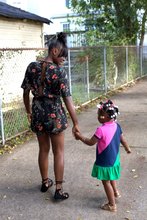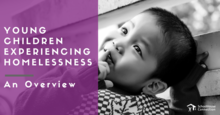Found 67 resources.
0
0
0
Released bi-monthly, each issue of the ZERO TO THREE Journal focuses on a critical topic within the early childhood development field. Journal articles are carefully composed to present current knowledge, latest research, and practical advice to help early childhood professionals do their best work in support of infants and toddlers.
Topics: Child welfare, Dual-generation, Early childhood, Homelessness, Housing, Low-income, Research, Safety
0
0
0
This brief presents a new approach to support the development of early math skills in young children. The approach synthesizes the influence of parents, home environment, and children’s health care providers. The brief draws on research to explain (1) why it is important to support early math development, (2) what early math is (and isn’t), (3) how early math and literacy development intertwine, and (4) the important role parents play in their child’s development. The brief ends with a description of a promising approach to support early childhood math development that leverages communication...
Topics: Child welfare, Early childhood, Education, Health, Literacy, Partnerships
 Shared by Housing Is
on Mar 18, 2019
Shared by Housing Is
on Mar 18, 2019 0
0
0
This report looks at school breakfast participation and policies in 76 large school districts across the country to evaluate successful practices in reaching more low-income children with school breakfast. This is a companion report to the School Breakfast Scorecard. Also check out our interactive school breakfast participation map.
Topics: Child welfare, Early childhood, Education, Food insecurity, Low-income, Nutrition
 Shared by Housing Is
on Mar 1, 2019
Shared by Housing Is
on Mar 1, 2019 0
0
0

For many years, the vulnerabilities of children experiencing homelessness have been glossed over on the assumption that their innate resilience would overcome the impact of homelessness. As someone who worked in the field, I would often hear, “Oh, they’ll never remember.” Today we know better. We know more about how the brain develops and about how trauma impacts brain development. There is a growing recognition among providers that these early years are critical for establishing a foundation for emotional, mental, and physical wellbeing, and that we don’t get a second chance at early...
Topics: Early childhood, Education, Homelessness, Housing, Low-income, Research, Safety, Stability
 Shared by Housing Is
on Feb 21, 2019
Shared by Housing Is
on Feb 21, 2019 0
0
0
This annotated resource compilation is intended to help state and local agencies access information and resources needed to better understand the federal legal protections and requirements associated with datasets collected by federal agencies or as part of a federally funded program.
Topics: Data sharing, Disabilities, Early childhood, Education, Health, Homelessness, Legislation & Policy, Post-secondary
0
0
0
In the summer of 2018, Ascend gathered more than two dozen state and national policy experts and other leaders in the fields of health and early learning at its Aspen Meadows Campus in Aspen, Colorado, to discuss the growing opportunity to leverage the 2Gen approach at the state level and determine how best to take promising new innovations to scale. This report offers a snapshot of specific things federal, state, and local leaders can keep doing, start doing, or stop doing to remove barriers and accelerate success.
Topics: Dual-generation, Early childhood, Family engagement, Legislation & Policy, Research
 Shared by Housing Is
on Feb 15, 2019
Shared by Housing Is
on Feb 15, 2019 0
0
0

For a very young child, the relationship with a primary caregiver, most often though not exclusively a mother, lays an important psychological foundation for later flourishing. Successful attachment and bonding in the first two years of life predicts healthy later development on a range of fronts, from mental health to educational skills. When bonding and attachment prove difficult, child development is affected. Recent advances in brain science allow this impact to be shown more clearly and more definitively.
Topics: Child welfare, Depression, Dual-generation, Early childhood, Health, Low-income, Mental health, Mobility
0
0
0
Times are changing rapidly for families—our households, work and the workforce do not look like they did just a decade ago. Challenges and barriers for parents continue to grow – skyrocketing costs of health care and child care, lack of flexibility at the workplace, and less time at home. Working parents have to balance their budget and time across an ever-changing landscape of needs: from caring for themselves, their children, and older family members, to affording quality child care and paying household bills. Removing barriers so families can care for their loved ones requires us to...
Topics: Child welfare, Dual-generation, Early childhood, Family engagement, Health, Legislation & Policy, Low-income, Preventative care
0
0
0
A Summary of Results from the MIHOPE and MIHOPE-STRONG Start Studies of Evidence-Based Home Visiting
A healthy birth and positive experiences in early childhood can promote health and development. One approach that has improved outcomes for children and their parents is home visiting, which provides individually tailored support, resources, and information to expectant parents and families with young children. This brief summarizes recently published reports from two national studies of evidence-based early childhood home visiting: the Mother and Infant Home Visiting Program Evaluation (MIHOPE) and MIHOPE-Strong Start.
Topics: Child welfare, Dual-generation, Early childhood, Home visiting, Metrics, Partnerships, Place-based, Preventative care, Research
0
0
0
Find Head Start Centers and Programs near you.
Topics: Early childhood, Education, Family engagement, Low-income
0
0
0
Teachers know that children learn better and are more likely to graduate when they live in a stable, affordable home.
Topics: Child welfare, Early childhood, Education, Housing, Partnerships, Youth
0
0
0
According to the Institute for Women’s Policy Research, 26% of undergraduate students--about 4.8 million students--are raising dependent children. Students of color are more likely to be parents; additionally, about 70% of parenting students are women. These students are balancing many competing demands: attending classes, keeping up with schoolwork, and caring for children. College and child care are costly, with the average cost of child care ranging between $8,000-$35,000 each year. As a result, parenting students are more likely to experience food and housing insecurity than students who...
Topics: Dual-generation, Early childhood, Education, Housing, Partnerships, Post-secondary, Youth
0
0
0

Women with children, especially, stay hidden in fear of losing custody of their children. As a result, we will never see them camping in tents or in downtown parks.
Topics: Early childhood, Homelessness, Housing, Legislation & Policy, Low-income, Safety, Stability
0
0
0
This 2018 report updates the annual Early Childhood Homelessness State Profiles and provides a snapshot of early childhood data available for children who are experiencing homelessness in each state, plus the District of Columbia and Puerto Rico. It includes publicly available data for 2015—2016 from the U.S. Census Bureau (Census), U.S. Department of Education (ED), U.S. Department of Housing and Urban Development (HUD), U.S. Department of Health and Human Services (HHS), and the Annie E. Casey Foundation.
Topics: Early childhood, Homelessness, Housing, Low-income, Research
0
0
0
Housing quality, instability, and unaffordability threaten the well-being of millions of children across the nation. Research shows that housing is the first rung on the ladder to economic opportunity and that a person’s access to opportunity is intrinsically linked with that of the community where they live. As home prices increase, the gap between rents and incomes continues to widen, and nearly half of today’s renters are cost burdened. Child welfare professionals, educators, and pediatricians can strengthen their work by understanding the central importance of housing as a determinant of...
Topics: Child welfare, Early childhood, Health, Housing, Research, Safety
0
0
0
Stricter work requirement policies for the Supplemental Nutrition Assistance Program (SNAP) at the federal level were left out of the recently passed farm bill, but state policymakers are still considering whether to expand or establish their own work requirements for SNAP and Medicaid, with the goal of incentivizing employment. There’s no question that good jobs help spur upward mobility. But if we are serious about helping people work, we have to get serious about helping people improve their skills.
Topics: Child welfare, Cost effectiveness, Dual-generation, Early childhood, Food insecurity, Legislation & Policy, Low-income, Research, Stability, Workforce development
0
0
0
Using a two-generation (2Gen) framework, Medicaid can be designed to support the social capital, health and well-being, educational attainment, and economic security of children and families, together, so they can maximize their health and thrive. This checklist outlines specific Medicaid policies and design choices adopted in Colorado to implement a 2Gen approach to improve the lives of children and families.
Topics: Dual-generation, Early childhood, Family engagement, Health, Low-income, Medicaid / Medicare
0
0
0

Prioritizing young children in Medicaid through cross-sector, innovative practice change has the potential to improve their lifetime trajectories, overall population health and long-run savings.
Topics: Child welfare, Early childhood, Health, Low-income, Medicaid / Medicare, Research
0
0
0
Shining a light on supportive approaches to noncustodial parenting, specifically by looking at Colorado’s successful CO-PEP program.
Topics: Dual-generation, Early childhood, Family engagement, Partnerships
0
0
0
The Colorado Division of Youth Services is working to transform the family experience by taking a two-generation (2Gen) approach to the services it provides.
Topics: Child welfare, Dual-generation, Early childhood, Family engagement, Low-income, Partnerships, Stability
0
0
0
With collectively more than 100 years of policy expertise and values-based leadership between us, Ascend at the Aspen Institute and the Housing Opportunity and Services Together initiative at the Urban Institute partnered to develop a set of recommendations on how to harness assisted housing and public-private housing partnerships for better outcomes for families.
Topics: Dual-generation, Early childhood, Education, Family engagement, Health, Housing, Low-income, Place-based, Research, Stability
0
0
0

This two-page fact sheet summarizes existing data on young children who are homeless and their families, including the impact of homelessness on health, development, early learning, and well-being.
Topics: Child welfare, Early childhood, Homelessness, Housing, Low-income
0
0
0

On Wednesday, October 24, President Trump signed into law bipartisan legislation, H.R. 6, the SUPPORT for Patients and Communities Act. This sweeping legislation contains many provisions that could help children, youth, and families experiencing homelessness who are impacted by the opioid crisis, as well as provisions to help all children and youth who experience trauma.
Topics: Child welfare, Dual-generation, Early childhood, Family engagement, Housing, Legislation & Policy, Low-income, Substance abuse, Supportive housing
0
0
0
CLPHA’s Housing Is Initiative is engaged in a number of cross-sector activities focused on developing partnerships, facilitating a community of practice, resource development, promoting best practices, online collaboration, policy and advocacy, and training and education. Read about recent activities in this Fall Update.
Topics: Child welfare, CLPHA, Community development, Cost effectiveness, Data sharing, Early childhood, Education, Family engagement, Funding, Health, Homelessness, Housing, Low-income, Medicaid / Medicare, Mental health, Partnerships, Place-based, Post-secondary, Research, Stability, Substance abuse, Workforce development, Youth
0
0
0
Which neighborhoods in America offer children the best chance to rise out of poverty? The Opportunity Atlas answers this question using anonymous data following 20 million Americans from childhood to their mid-30s. Now you can trace the roots of today's affluence and poverty back to the neighborhoods where people grew up. See where and for whom opportunity has been missing, and develop local solutions to help more children rise out of poverty.
Topics: Asset building, Child welfare, Dual-generation, Early childhood, Education, Health, Housing, Low-income, Mobility, Stability, Youth
 Shared by Housing Is
on Oct 12, 2018
Shared by Housing Is
on Oct 12, 2018 
